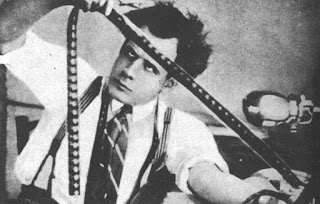#3 I’ve experienced seeing something during editing that as I was watching it, changed the scene completely because I saw that it might flow better. Editing is like a puzzle that is actually easy to solve, but the pieces can fit in thousands of different ways. I can’t say the same thing in regards to older methods but I can say I actually hate avid with a passion. That program is incredibly complicated and if I am the one that has to edit this film, then I would like the software to be straightforward, so that I don’t have to go through the pain of learning it, meanwhile I could have used an adobe program or final cut and just easily get what I was looking for without all the hassle. I didn’t know early editors were women; I get sick about hearing only guys doing things when I know women in art history bring a lot of creative and innovative art pieces. I do know that women directors with feminist backgrounds were big in the early horror movies. The women in those movies are shown to be
Posts
- Get link
- Other Apps
#2I’ve seen a lot of experimental films experiment with time, as in the scenes jumping quickly, the reason being, to make some point and force the viewers to look at whatever the filmmakers meaning behind the film. There is diminished viewing in that way but I also see some artistic films have a vastly different plot with diminished viewing but those films were all very excellent. This diminished viewing the author is mainly talking about though is in reference to the history of film, back when you couldn’t save a film so easily because computers were not in existence. Archives popped up all over the world to keep what films were deemed essential and most important; but many films sustained damage through general abuse, alterations, mishaps and so much more. As someone who lives in the booming age of digital technology I’ve always noticed how different the quality was on these movies and quite frankly most of the older films bored me to death. Personally, I feel like films in the begin
- Get link
- Other Apps
#1Response to mutation on the forms If you define the title meticulously relating to film, it’s basically stating morphing; changing into something else constantly which is what films all about. Its motion so there’s always going to be motion. I appreciate that there was a place created(no.w.here) for people to learn the culture of films and also a place that offered ways of making traditional non-digital films. I think accessibility is very needed, especially since money can add up when you need like 20 different things to produce the traditional film of your desire. I actually have never thought about films related to curators, I usually associate curators with paintings and things of that nature. I think it’s a really cool concept that allows people to see that film does have history and what worked and what did not work. Also, film as an art form because when I describe it as an art, people usually get confused thinking of it in only in mechanical ways. Technology makes it easier
Loving a Disappearing Image & Mutation on A Form
- Get link
- Other Apps
Both readings give a great insight to how film and film viewing are being perceived today. From spaces in which the film is being watched to the ways it is now being viewed. The common theme in both readings is how can the image be taken in and challenged what it is to view a film. In the reading Loving a Disappearing Image, we start to look at the death or decay of film. Which is a great play on what is actually happening in the world. To view a decaying image as art is to acknowledge the same beauty that is in actual death. Addressing the natural process of what it is like to have a memory of a form that over time dissipates is pretty amazing. The reading made me sit with the fact of decay as a expressive form of art in itself. Ciara Elle Bryant
Welcome to 16mm Production at SMU
- Get link
- Other Apps

Hello and welcome to 16mm production at SMU. I'm looking forward to introducing you to the traditional (and less traditional) methods of filmmaking using photochemical film. This blog will be a central place for you to post responses to the readings we will be doing in class. These readings, distributed on Canvas as .pdf files, are to encourage you to think about why we're shooting film in a digital world and to provide inspiration for your projects. You will then post your responses to these readings here in preparation for in-class discussion. I'm looking forward to discussing these readings with you and seeing your films this semester! Best of luck.